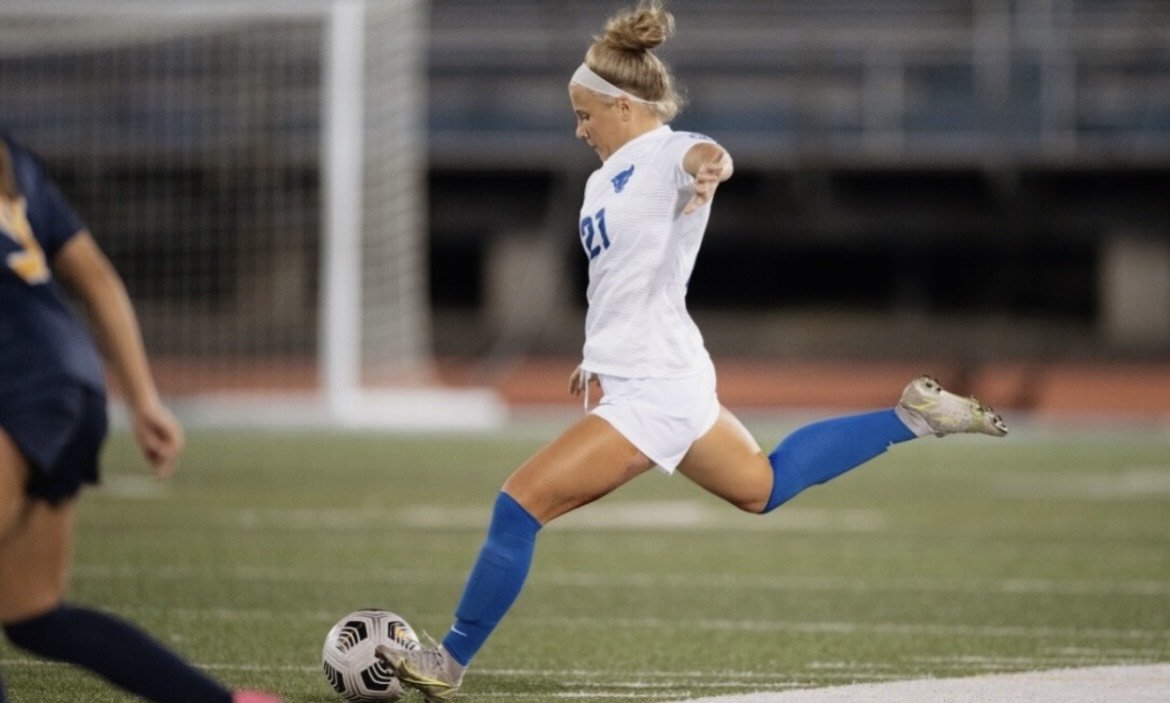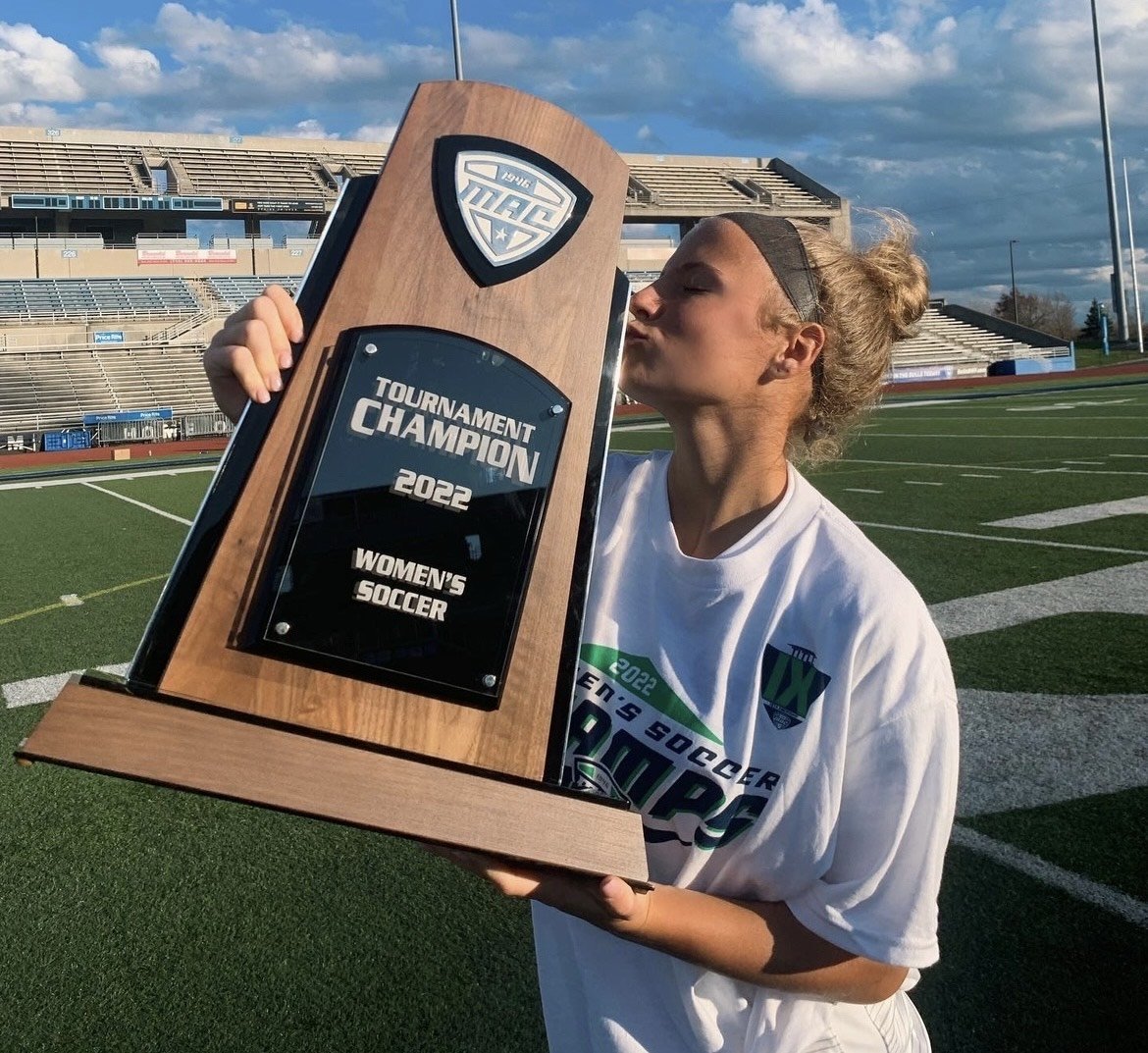Grief on the Field: Competing After Losing My Mom
By Kaylin Ricci | IG: @Kaylinricci
Hi, my name is Kaylin Ricci, and this is my story!
I was born and raised in Massapequa, Long Island, New York. I recently completed my final season of eligibility as a Division 1 soccer player at the University at Buffalo in 2024, where I played all four years. I started playing soccer at age 8, which was later than most, but I quickly fell in love with the sport. By 10, soccer became my life. I played on multiple teams to train with the best and improve, always keeping my goal of playing in college in mind. My parents supported me every step of the way attending games, tournaments, clinics, and college visits.
The summer before my junior year, I committed to the University at Buffalo. My journey, however, was far from easy. In my first two years, I mostly sat on the bench, but I worked hard to earn a starting spot in my final two seasons. Along the way, I battled injuries—multiple stress fractures, hip issues, and a concussion. Each off-season was spent in rehab, which meant I never truly got to rest. After my junior season in 2023, I suffered a knee injury that required major surgery and would keep me off the field for 9 months. It was the longest I had ever been away from the sport, and finding my confidence during that time was difficult.
The plan was for me to take a medical redshirt year and return for the 2025 season, but I pushed through my recovery. I was cleared to play just a week before the home opener of my final season. I was overjoyed. I even started that game on August 15th. My parents, who usually never missed my games, were both working and couldn’t attend. I thought nothing of it. We won the game, and I was just grateful to be back on the field.
After the game, as I was heading back to the locker room, I heard a familiar voice. “Kay.” I turned around, and there was my mom. She had driven 10 hours to surprise me, arriving just in time for the final moments of the game. I was overcome with joy. That night, my mom and I stayed in a hotel, chatting and laughing like any normal night. The next morning, I said goodbye to her, gave her a hug, and told her to text me when she got home.
That was the last time I saw my mom.
Later that day, I assumed she hadn’t texted because she was driving back to Long Island. But the next morning, I still hadn’t heard from her. I learned that she had stopped in Cortland to break up the drive, which wasn’t unusual. But by 10 a.m., I received a call from my father. “Mom’s gone.”
The world stopped.
I don’t remember much after that. I spent the next 12 days at home attending my mother’s services and funeral. It was a blur. But I do remember watching my team beat the #7 ranked team, and seeing my number held up in the celebration brought me to tears. I couldn’t fathom returning to soccer without my mom, but after much thought, I realized I couldn’t stay home. My passion was in Buffalo, and I knew my mom would want me to continue.
When I returned to Buffalo, I was met with sympathy and understanding, but I just wanted to be treated normally. I didn’t want special treatment because of what had happened. Thankfully, my coaches respected that and helped me navigate the season with care. Some days, I was able to push through like nothing had happened. Other days, the grief overwhelmed me, and I could barely focus on the game.
The season sped by, and I often found myself questioning if it was worth it without my mom. I couldn’t shake the thought that she would have been there at every game, cheering me on. Senior day was especially hard without her there, but my father kept reminding me she was with me, watching from above.
As the season continued, I drew strength from my father. He missed all but one of my games and he flew back and forth from Long Island, making sure I didn’t feel alone. He’d sometimes fly in just for the game, then catch a flight back home to continue caring for my brother. My dad’s dedication kept me going. He constantly reminded me how proud my mom would be of me.
The pressure I put on myself was immense. I feared that if I didn’t perform well, I was letting my mom down. But with support from my coaches and dad, I realized that my mom never cared about my performance. She was always there for me, no matter the outcome. Just showing up was enough.
Then came the conference semifinals. We won in dramatic fashion, and I played the full 90 minutes, having one of the best performances of my career. After the game, I looked up to the sky and whispered, “This is for you, Mom.” I felt her presence in that moment. I ran into my dad’s arms, and through his tears, he said, “I’m so proud of you. Mom loves you. She’s proud of you.”
For the first time all season, I truly felt that I had made my mom proud.
Unfortunately, our season ended in the conference finals. It was a bitter loss, especially after everything I had been through. But as I reflected on the season, I was filled with gratitude. Despite everything, I had completed an entire season of college soccer after losing my mother. I couldn’t fully explain how I managed it, but I know it was thanks to my unwavering support system.
My teammates, coaches, and most of all, my father, helped me push through the unimaginable grief. My father’s strength, balancing his own grief while being there for my brother and me, was beyond inspiring. That’s why we call him “Superman.” Without him, I couldn’t have kept going.
This experience has taught me that life is unpredictable. Just nine months ago, I couldn’t imagine a life without my mother. But I kept pushing forward for her. My mom’s spirit remains a guiding force in my life. Losing her is something I still can’t fully grasp, but I’ve learned to keep going, to give myself grace, and to remember that just showing up is enough.
Through the pain, I discovered my own strength. In the face of overwhelming loss, I found resilience. Life will challenge you in ways you never expect, but it’s in those moments that you realize just how powerful you really are.





